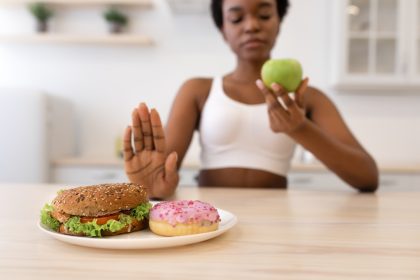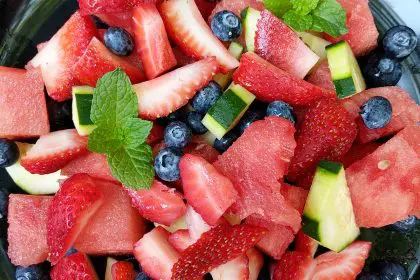Getting quality sleep feels like mission impossible for millions of Americans who spend their nights counting sheep instead of catching z’s. While some people drift into dreamland without effort, others face a nightly battle with restlessness that leaves them exhausted and frustrated.
Nature’s sleep medicine cabinet: Meet your new bedtime allies
- The sleep-inducing power of fatty fish goes beyond its rich omega-3 content. Salmon and tuna work overtime in your body, managing serotonin levels and reducing inflammation that might keep you awake. Adding these seafood superstars to your dinner menu could be your ticket to dreamland.
- Your nutty friends aren’t just for snacking. Almonds, walnuts, flaxseeds, and chia seeds pack a double punch with magnesium and melatonin. These tiny treasures make perfect bedtime companions, especially when you’re craving something crunchy before lights out.
- Turkey’s fame as a sleep promoter isn’t just Thanksgiving lore. This lean protein’s tryptophan content supports your body’s production of sleep-regulating hormones. While you won’t need a full holiday feast, incorporating turkey into your evening meal could help you wind down naturally.
The dairy connection to deeper sleep
- Yogurt brings more to the table than breakfast appeal. Its calcium content plays matchmaker between your body and melatonin, potentially making those midnight wake-ups less frequent. A small serving before bed might just become your new sleep ritual.
- Oats aren’t just morning fuel. These complex carbohydrates trigger serotonin release, potentially making your journey to sleep smoother. Consider a warm bowl of oatmeal as your evening comfort food, especially on restless nights.
Fresh picks from nature’s sleep garden
- Cherries, particularly the tart varieties, might be nature’s answer to sleep supplements. Research points to their natural melatonin content as a potential sleep aid. Whether fresh or as juice, these ruby gems could help you catch more quality rest.
- Kiwis might look unassuming, but they’re sleep giants in disguise. Packed with serotonin and folate, these fuzzy fruits have shown promise in helping people fall asleep faster and stay asleep longer. Adding a kiwi to your evening routine could transform your night.
- Bananas bring the perfect bedtime blend of magnesium and potassium. These minerals work together to relax your muscles and regulate sleep patterns. One banana before bed might be the natural solution you’ve been searching for.
Sweet dreams are made of chocolate
- Dark chocolate lovers, rejoice. Your favorite treat contains compounds that support relaxation and sleep quality. The key lies in its serotonin precursors and magnesium content. Just remember to keep portions small – a square or two is plenty to reap the benefits without overdoing it.
- Herbal teas deserve their calming reputation. Chamomile leads the pack as nature’s tranquilizer, while valerian and lavender teas offer additional paths to peaceful sleep. These warm beverages create the perfect ending to your day, signaling your body that it’s time to rest.
Beyond the plate: Creating your perfect sleep sanctuary
The journey to better sleep extends beyond your kitchen. Your bedroom environment plays a starring role in quality rest. Think of your sleep space as a private retreat – cool, quiet, and free from the day’s distractions. Many sleep experts recommend keeping your bedroom temperature between 65 and 68 degrees Fahrenheit for optimal rest.
Modern life throws countless obstacles at healthy sleep patterns. Blue light from phones and tablets tops the list of sleep disruptors. Making your bedroom a device-free zone at least an hour before bedtime helps your brain recognize it’s time to wind down.
Time your treats right for maximum benefit
Timing matters when it comes to sleep-supporting foods. Eating a heavy meal right before bed can backfire, leaving you uncomfortable and awake. Instead, try having your last substantial meal at least three hours before bedtime. If you need a nighttime snack, keep it light and choose from the sleep-promoting options mentioned above.
The exercise equation in your sleep formula
Physical activity during the day sets the stage for better sleep at night. However, timing matters here too. Morning and afternoon workouts tend to support healthy sleep patterns, while evening exercise might leave you too energized when bedtime rolls around. Find your sweet spot by paying attention to how different exercise times affect your sleep quality.
When stress crashes the sleep party
Life’s pressures often follow us to bed, making relaxation feel impossible. Creating a pre-sleep ritual helps draw a line between daytime stress and nighttime rest. This might include gentle stretching, writing in a journal, or practicing deep breathing exercises. The key is consistency – your body learns to recognize these activities as signals that sleep is approaching.
Listen to your body’s unique rhythm
While these foods and strategies offer promising paths to better sleep, remember that everyone’s body responds differently. Pay attention to how various foods affect your sleep quality and adjust accordingly. Some people might find that certain foods work better than others, or that combining several strategies yields the best results.
When natural approaches need backup
If sleep continues to evade you despite incorporating these natural strategies, consider reaching out to a healthcare provider. They can help identify any underlying issues and suggest additional approaches. Sometimes, the path to better sleep requires professional guidance to complement your natural efforts.
Your sleep success blueprint
Think of good sleep as a puzzle where every piece matters. The foods you eat, your evening routine, your sleep environment, and your daily habits all work together to create the complete picture of restful sleep. Start by incorporating one or two of these suggestions and gradually build your personal sleep-supporting routine.
Remember that improving sleep quality often requires patience and consistency. Small changes, maintained over time, can lead to significant improvements in how well you rest. The effort you invest in better sleep pays dividends in every aspect of your life, from your physical health to your emotional well-being.
As scientists continue to uncover the mysteries of sleep, one thing remains clear: the foods we eat play a crucial role in how well we rest. By making mindful choices about what and when you eat, you’re not just feeding your body – you’re supporting your natural sleep cycles and setting yourself up for the restorative rest you deserve.
Your path to better sleep starts in your kitchen, but it doesn’t end there. By combining sleep-supporting foods with healthy sleep habits, you’re creating a comprehensive approach to improving your rest. Sweet dreams might be closer than you think – perhaps just a few bites away.














